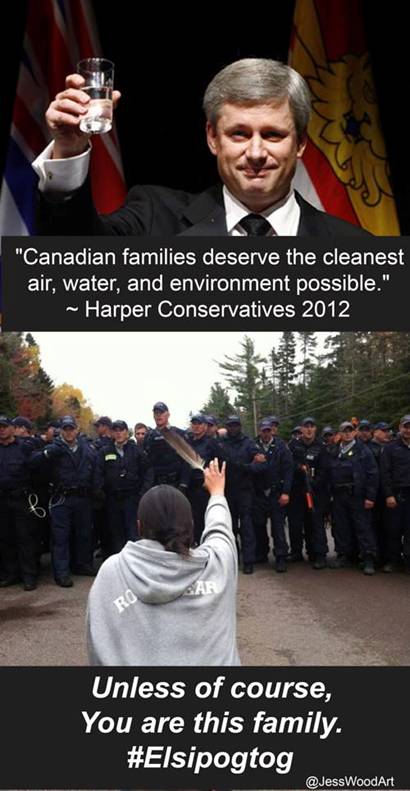The often-ignored facts about Elsipogtog, The majority of Canadians have been woefully under-informed about what is really going in Elsipogtog by Chelsea Vowel [Chelsea Vowel (BEd, LLB) is a Métis writer and educator from Lac Ste. Anne, Alberta and currently lives in Montreal], November 14, 2013, Toronto Star
The majority of Canadians have been woefully under-informed about what is one of the most important outstanding issues related to the events in Elsipogtog: land and resource ownership. In 1997, the landmark Supreme Court Decision in Delgamuukw finally clarified that even under Canadian law, Aboriginal title to most of the land within British Columbia’s provincial borders had never been extinguished. This ruling had immediate implications for other areas of the country where no treaties ceding land ownership were ever signed. One day, Canadians woke up to a legal reality in which millions of acres of land were recognized as never having been acquired by the Crown, and that elephant has been occupying our national room ever since. Unfortunately, this glaring issue did not seem to percolate into the wider Canadian consciousness, and many people remain unaware of it.
In 1999, the Supreme Court passed down another judgement confirming that the Peace and Friendship Treaties of 1760-1761 did not cede land or resources. This cannot be emphasized strongly enough: the Mi’kmaq never gave up legal rights to their land or resources. Canada does not own the land that the people of Elsipogtog are defending. This is not conspiracy theory, or indigenous interpretation. This is Canadian law, interpreted by the Supreme Court of Canada, applying Canadian constitutional principles. Yet somehow, this most important fact is left out of most reports on Elsipogtog as though it is barely relevant. Often misunderstood by the general public, too, is that the people of Elsipogtog have widespread support from Acadians and Anglos in the area. In fact, the majority of people living in New Brunswick support a moratorium on fracking, in direct opposition to Premier David Alward’s wholehearted embracing of shale gas exploration. Opposition to fracking is not a fringe position; it is the majority position in the Atlantic provinces and elsewhere throughout Canada. So here you have a group of people who never gave up ownership of their land or resources, opposing widely contested shale gas exploration, which was approved by a government that does not own the land or resources, acting with the support of their non-native neighbours and being reported on by mainstream media outlets that often fail to address the substantive issues. All of this is extremely problematic, even if you do not take into account the violence and the timing of the Oct. 17 RCMP raid.
None of these facts are changed by burning cars, by the presence or absence of rubber bullets, or by whether or not Canadians like indigenous peoples. Those attempting to paint the people of Elsipogtog as law breakers must not be allowed to ignore the wider legal context which calls into question the legitimacy of resource exploitation without consent anywhere in Canada, particularly on unceded lands. Earlier this week, SWN Resources’ lawyer offered to withdraw a lawsuit against several community members if the company could finish exploration. Indigenous and non-Indigenous allies in the area reaffirmed their intention to stand together in defence of the land. Today, the people of Elsipogtog and their allies stand again with their drums, their eagle feathers and their concerns for the land and for the legacy of all future generations. A line of armed RCMP officers face them, ostensibly to protect public safety as SWN Resources attempt to move exploration vehicles back into the area. Using the #Elsipogtog tag, social media has made it possible for people throughout Canada and the rest of the world to access real time information from mainstream and independent media sources as the situation develops. Many hope that this immediate scrutiny will encourage the RCMP to avoid moving in with overwhelming force once more. Fears of renewed violence should not blind us to the underlying issues: unresolved land claims, resource development without prior and informed consent, concerns of environmental degradation and inadequate economic benefits to residents. Elsipogtog is just one area of the country coming face to face with the consequences of these problems. This is not a “native” issue; this situation impacts every single one of us living on these lands. [Emphasis added]
[Refer also to:
Texas fracking company SWN Resources Canada Inc. sues Mi’kmaq warrior youth

